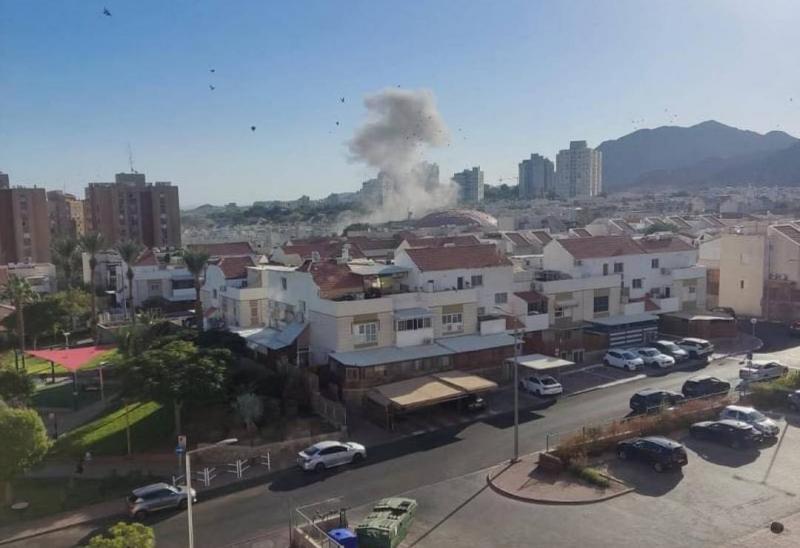The Hebrew website "Walla" revealed that Eilat is "collapsing" and that the city is "dying from pain," amid declining economic activity due to the war on Gaza and Houthi attacks. "Walla" confirmed that 15,000 hotel employees in Eilat will be laid off "amid the indifference of decision-makers in Israel" regarding the city's collapse. It explained that the chairman of the finance committee in the Israeli Knesset, Moshe Gafni, called on the government a month ago to respond to a request for a plan that could revive Eilat in four days.
"Walla" added that "four days have passed and a month has gone by, and there is no plan." The article describes how the weeks have been characterized by typical shouting, data exchange, and fruitless discussions from the finance ministry and tax authority, which will culminate in another special committee meeting dedicated to Eilat today, Wednesday. During Tuesday's session, Knesset finance committee members demanded that the finance ministry immediately formulate a special compensation plan for Eilat, threatening legislation if it is not done.
Eli Lankry, the mayor of Eilat, presented "alarming data" indicating that store sales had dropped by about 35% this month, and credit card spending in Eilat decreased by approximately 40% since the outbreak of the war on Gaza. Additionally, Lankry pointed out that unemployment in the city stands at a staggering 15%, describing this situation as "urgent" for addressing Eilat's plight. He also warned that hotels would soon close: "The evacuated individuals will leave, and unemployment rates could reach 50-60%. It's clear that business activity in Tel Aviv has also dropped by 60%, but in Eilat, it has completely plummeted."
During the discussion, Knesset member Moshe Gafni stated, "Eilat geographically is in a remote location. The truth is that Eilat is economically collapsing. We cannot stand idly by and say that there are general regulations; they do not solve the problems related to the city of Eilat." Lankry remarked that the forecasts he presented regarding the worsening economic situation were accurate and severely criticized treasury representatives: "This decline will continue for the next three months as well; Eilat has lost this winter; everything has been canceled. Come and see what is happening there, see the empty parks, what is happening in the malls. The trend of decline continues in Eilat, and this should not surprise anyone; there is no tourism and no expectation for tourism. We asked the treasury to provide something, bring something, show us a paper, but I have not seen a single proposal."
"Walla" noted that these harsh figures have not captured the interest of senior officials in the finance ministry and tax authority, who have no intention of offering special assistance to Eilat. The finance ministry remains convinced that the compensation plan for all residents is adequate, believing companies will face the sharp revenue decline on their own. Lankry stated: "They told me there are different data... I asked them to share it with me, but I have not received any data from them thus far. Since we have no choice, we will come to the finance committee today with an alternative plan."
The compensation plan proposed by Mayor Lankry suggests providing Eilat with long-term compensation due to significant and lasting damages. He stated, "The city is built on tourism through rotation, with tourist cycles of 3-4 days. This winter, everything is dying. There are no conferences, no festivals, no concerts, no sports events; we are receiving rockets and facing daily threats from the Houthis. The difference between COVID-19 and war is that when they lifted lockdowns, everyone rushed to Eilat to relax. Now no one desires to go out... Eilat has collapsed and is dying from suffering."
Lankry emphasized that "Eilat is different because it relies entirely on tourism, with over 80% of businesses in Eilat negatively affected, and the damage is ongoing. If it were just October, it could be manageable, but when it comes to three consecutive months with a downward trend, the state compensation will not help at all." He continued, "In one week, 55,000 meals were sold from donations, and our funds have run out. We will need to invest hundreds of millions in Eilat in the future. In a month or two, the evacuated individuals will leave the hotels. What will happen then? They will close, and about 15,000 workers will be laid off, leading the state to pay them unemployment benefits and transfer payments, alongside lost tax revenues. All of this due to the silence and indifference of decision-makers."
Philippe Azard, the CEO of Eilat Municipality, stated: "In a week and a half, 20 hotels will close, and we will see a rise in unemployment by the thousands." Yaron Gindi, head of the Israeli Tax Advisors Association, warned to Yedioth Ahronoth that "companies in Eilat are in a state of collapse, with no expected improvement in the near future." The Houthis continue to launch consecutive attacks on Eilat in response to the bloody Israeli war on Gaza.




